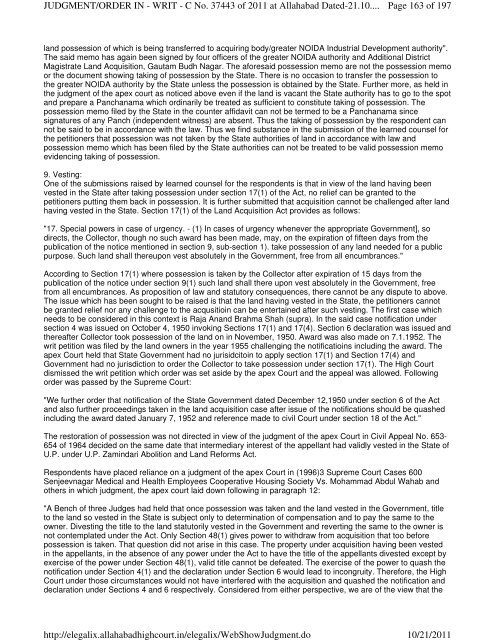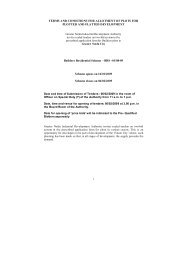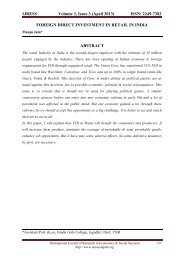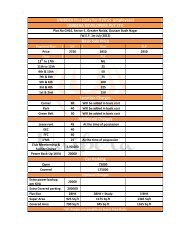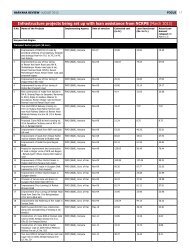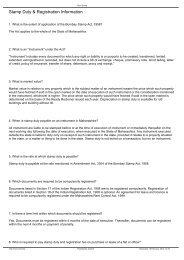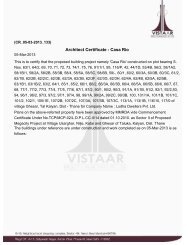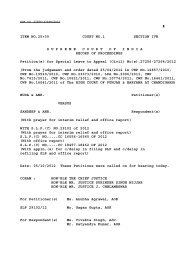eLegalix - Allahabad High Court Judgment Information System ...
eLegalix - Allahabad High Court Judgment Information System ...
eLegalix - Allahabad High Court Judgment Information System ...
You also want an ePaper? Increase the reach of your titles
YUMPU automatically turns print PDFs into web optimized ePapers that Google loves.
JUDGMENT/ORDER IN - WRIT - C No. 37443 of 2011 at <strong>Allahabad</strong> Dated-21.10....http://elegalix.allahabadhighcourt.in/elegalix/WebShow<strong>Judgment</strong>.doPage 163 of 19710/21/2011land possession of which is being transferred to acquiring body/greater NOIDA Industrial Development authority".The said memo has again been signed by four officers of the greater NOIDA authority and Additional DistrictMagistrate Land Acquisition, Gautam Budh Nagar. The aforesaid possession memo are not the possession memoor the document showing taking of possession by the State. There is no occasion to transfer the possession tothe greater NOIDA authority by the State unless the possession is obtained by the State. Further more, as held inthe judgment of the apex court as noticed above even if the land is vacant the State authority has to go to the spotand prepare a Panchanama which ordinarily be treated as sufficient to constitute taking of possession. Thepossession memo filed by the State in the counter affidavit can not be termed to be a Panchanama sincesignatures of any Panch (independent witness) are absent. Thus the taking of possession by the respondent cannot be said to be in accordance with the law. Thus we find substance in the submission of the learned counsel forthe petitioners that possession was not taken by the State authorities of land in accordance with law andpossession memo which has been filed by the State authorities can not be treated to be valid possession memoevidencing taking of possession.9. Vesting:One of the submissions raised by learned counsel for the respondents is that in view of the land having beenvested in the State after taking possession under section 17(1) of the Act, no relief can be granted to thepetitioners putting them back in possession. It is further submitted that acquisition cannot be challenged after landhaving vested in the State. Section 17(1) of the Land Acquisition Act provides as follows:"17. Special powers in case of urgency. - (1) In cases of urgency whenever the appropriate Government], sodirects, the Collector, though no such award has been made, may, on the expiration of fifteen days from thepublication of the notice mentioned in section 9, sub-section 1). take possession of any land needed for a publicpurpose. Such land shall thereupon vest absolutely in the Government, free from all encumbrances."According to Section 17(1) where possession is taken by the Collector after expiration of 15 days from thepublication of the notice under section 9(1) such land shall there upon vest absolutely in the Government, freefrom all encumbrances. As proposition of law and statutory consequences, there cannot be any dispute to above.The issue which has been sought to be raised is that the land having vested in the State, the petitioners cannotbe granted relief nor any challenge to the acqusitioin can be entertained after such vesting. The first case whichneeds to be considered in this context is Raja Anand Brahma Shah (supra). In the said case notification undersection 4 was issued on October 4, 1950 invoking Sections 17(1) and 17(4). Section 6 declaration was issued andthereafter Collector took possession of the land on in November, 1950. Award was also made on 7.1.1952. Thewrit petition was filed by the land owners in the year 1955 challenging the notificatioins including the award. Theapex <strong>Court</strong> held that State Government had no jurisidcitoin to apply section 17(1) and Section 17(4) andGovernment had no jurisdiction to order the Collector to take possession under section 17(1). The <strong>High</strong> <strong>Court</strong>dismissed the writ petition which order was set aside by the apex <strong>Court</strong> and the appeal was allowed. Followingorder was passed by the Supreme <strong>Court</strong>:"We further order that notification of the State Government dated December 12,1950 under section 6 of the Actand also further proceedings taken in the land acquisition case after issue of the notifications should be quashedincluding the award dated January 7, 1952 and reference made to civil <strong>Court</strong> under section 18 of the Act."The restoration of possession was not directed in view of the judgment of the apex <strong>Court</strong> in Civil Appeal No. 653-654 of 1964 decided on the same date that intermediary interest of the appellant had validly vested in the State ofU.P. under U.P. Zamindari Abolition and Land Reforms Act.Respondents have placed reliance on a judgment of the apex <strong>Court</strong> in (1996)3 Supreme <strong>Court</strong> Cases 600Senjeevnagar Medical and Health Employees Cooperative Housing Society Vs. Mohammad Abdul Wahab andothers in which judgment, the apex court laid down following in paragraph 12:"A Bench of three Judges had held that once possession was taken and the land vested in the Government, titleto the land so vested in the State is subject only to determination of compensation and to pay the same to theowner. Divesting the title to the land statutorily vested in the Government and reverting the same to the owner isnot contemplated under the Act. Only Section 48(1) gives power to withdraw from acquisition that too beforepossession is taken. That question did not arise in this case. The property under acquisition having been vestedin the appellants, in the absence of any power under the Act to have the title of the appellants divested except byexercise of the power under Section 48(1), valid title cannot be defeated. The exercise of the power to quash thenotification under Section 4(1) and the declaration under Section 6 would lead to incongruity. Therefore, the <strong>High</strong><strong>Court</strong> under those circumstances would not have interfered with the acquisition and quashed the notification anddeclaration under Sections 4 and 6 respectively. Considered from either perspective, we are of the view that the


